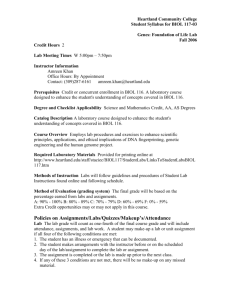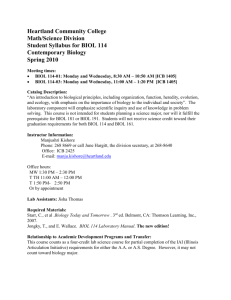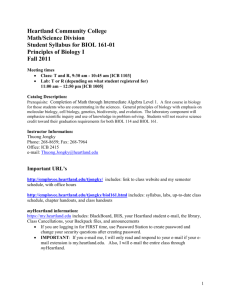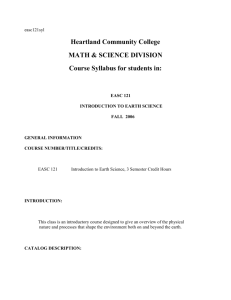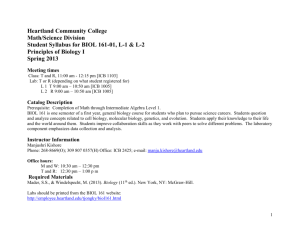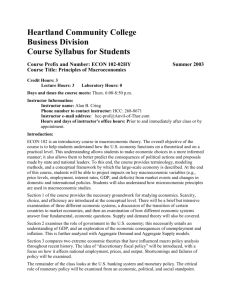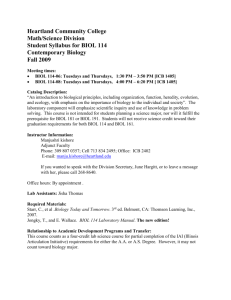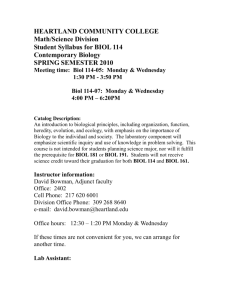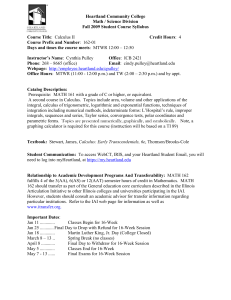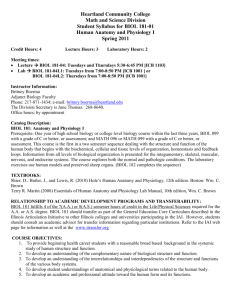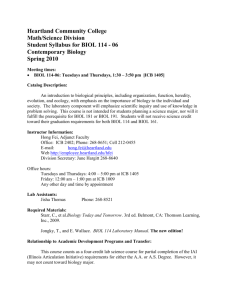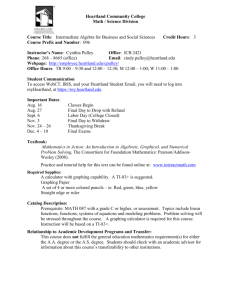BIOL 114 Kerr - Heartland Community College
advertisement
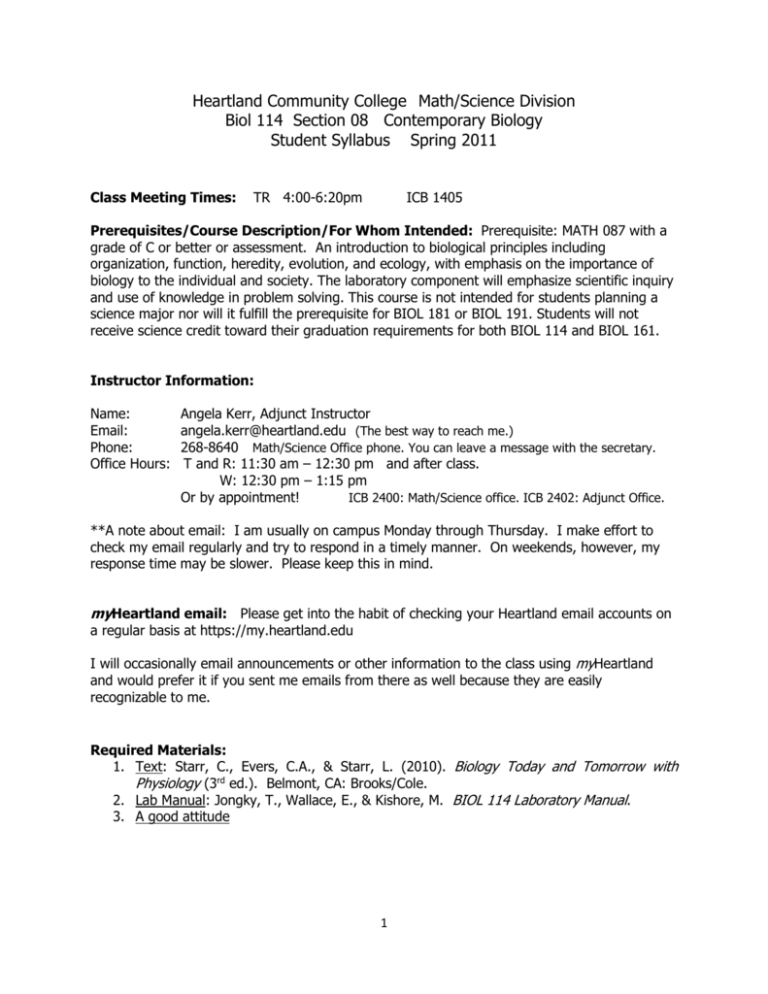
Heartland Community College Math/Science Division Biol 114 Section 08 Contemporary Biology Student Syllabus Spring 2011 Class Meeting Times: TR 4:00-6:20pm ICB 1405 Prerequisites/Course Description/For Whom Intended: Prerequisite: MATH 087 with a grade of C or better or assessment. An introduction to biological principles including organization, function, heredity, evolution, and ecology, with emphasis on the importance of biology to the individual and society. The laboratory component will emphasize scientific inquiry and use of knowledge in problem solving. This course is not intended for students planning a science major nor will it fulfill the prerequisite for BIOL 181 or BIOL 191. Students will not receive science credit toward their graduation requirements for both BIOL 114 and BIOL 161. Instructor Information: Name: Email: Phone: Office Hours: Angela Kerr, Adjunct Instructor angela.kerr@heartland.edu (The best way to reach me.) 268-8640 Math/Science Office phone. You can leave a message with the secretary. T and R: 11:30 am – 12:30 pm and after class. W: 12:30 pm – 1:15 pm Or by appointment! ICB 2400: Math/Science office. ICB 2402: Adjunct Office. **A note about email: I am usually on campus Monday through Thursday. I make effort to check my email regularly and try to respond in a timely manner. On weekends, however, my response time may be slower. Please keep this in mind. myHeartland email: Please get into the habit of checking your Heartland email accounts on a regular basis at https://my.heartland.edu I will occasionally email announcements or other information to the class using myHeartland and would prefer it if you sent me emails from there as well because they are easily recognizable to me. Required Materials: 1. Text: Starr, C., Evers, C.A., & Starr, L. (2010). Biology Today and Tomorrow with Physiology (3rd ed.). Belmont, CA: Brooks/Cole. 2. Lab Manual: Jongky, T., Wallace, E., & Kishore, M. BIOL 114 Laboratory Manual. 3. A good attitude 1 Relationship to Academic Development Programs and Transfer: BIOL 114 fulfills 4 of the semester hours of credit in Life and Physical Science required for the A.A. or A.S. degree. This course should transfer as part of the General Education Core Curriculum described in the Illinois Articulation Initiative to other Illinois colleges and universities participating in the IAI. However, students should consult an academic advisor for transfer information regarding particular institutions. Refer to the IAI web page for information as well at www.itransfer.org Course Objectives (Learning Outcomes): 1. Students hypothesize, experiment, gather data, and formulate conclusions. 2. Students question validity of results and conclusions that are presented in lab, newspapers, magazines, TV, or radio. 3. Students relate concepts (in cellular, organismal, and biodiversity) to their daily life and to the world around them. 4. Students synthesize information from various sources to produce a product. 5. Students demonstrate responsibility for the community and global, ecological environment. 6. Students improve independent learning skills. Method of Evaluation: The final grade will be based on the following requirements: 80% of your final class grade will come from classroom components such as quizzes, assignments, projects, unit exams, and the cumulative final. 20% of your final grade will come from lab activities. Any student who does not take the final exam will receive an F for the class. Grading Scale: 90 80 70 60 0 - 100 % - 89 % - 79 % - 69 % - 59 % = = = = = A B C D F 2 Make-Up Policies: 1. Unit exams: I will allow you to make up one missed exam. You must take it before the next class period. If you miss an exam and wish to retake it, you must make arrangements with me to take it in the testing center. Caveat: If you know in advance that you will be unable to take a unit exam at the scheduled date and time, contact me BEFORE the exam date to make arrangements to take it before the scheduled date. 2. Quizzes: I will allow you to make up 2 missed quizzes, which must be taken before the next class period. But again, if you know in advance that you will be gone, we can make arrangements to have you take a quiz beforehand. 3. Labs: There are no make-ups for lab activities. The student will complete most labs before leaving class. If a lab assignment has to be finished outside of class, the assignment is due at the beginning of the next class day that the student comes to class. Only students who attend lab can complete lab assignments. 4. In-class activities: There are no make-ups for in-class activities. 5. Homework assignments & other projects: Due at the beginning of class. If you turn something in late, I will take 10% off your grade for each weekday the assignment is late. 6. In extreme cases of extended absence beyond a student’s control (such as documented severe illness, documented accidents, military duties, etc.) some leniency in makeups will be considered. Student should contact instructor as soon as possible to discuss. Attendance Policy: 1. Attendance will be taken at each class. If you come after attendance has been taken, it is your responsibility to inform me at the end of the class period that you were present. 2. Frequent absences, especially before midterm, puts you in danger of being dropped from the class. 3. Please turn off electronic devices at the start of lecture and lab. If your situation is such that you absolutely need to take calls, please inform me. Keep your phone on vibrate, then step out into the hallway and close the door. Do not text during class. 4. Please be courteous and do not be disruptive to other students. I will ask you to leave class if your behavior becomes bothersome. You may bring beverages as long as they are covered. If you bring food to lecture, avoid anything noisy or messy. No food is allowed during the labs. 3 Incompletes: An Incomplete grade may be justified if a student encounters extreme circumstances (e.g., serious illness, accident, death or serious illness in the immediate family) toward the end of the semester and is unable to complete the semester. The student must be in a position to pass the class if the Incomplete is given. The student must meet with me to discuss whether an Incomplete will be allowed and must sign a form requiring him/her to finish the class by next semester. Required Writing and Reading: The student will read the textbook, lab manual, and all hand-outs. The student will write summaries for articles and possible projects and/or portfolio, and students will write answers for various worksheets and lab questions. Student Responsibilities ( Will help you in learning the material & succeeding in the course): 1. 2. 3. 4. 5. 6. 7. 8. 9. Be on time to, attend, and participate in lecture and lab sessions regularly. Bring textbook and other materials to class. Take thorough notes in class. Complete all assignments, using the required format, and turn them in on time. Study the required textbook pages and be prepared for class discussion. Review notes, textbook, and all material for exams. Write down questions to ask before the exams. Take the exams as scheduled. Review the corrected tests in class after they are returned, using the opportunity to more completely understand the material. 10. Avoid disruptive or abusive behavior. Respect your classmates and instructor. Notice of Cancelled Class Sessions: Cancelled class sessions, for all HCC classes, will be listed under Cancelled Class Meetings in the A-Z Index and under Academic Information in the Current Students page on the HCC Web site. Go to http://www.heartland.edu/classCancellations/ or log in to My Heartland to learn what classes have been cancelled for that day and the upcoming week. Be sure to check the last column, which might contain a message from the instructor. 4 Academic Integrity (Adapted from the Catalog): Academic integrity is a fundamental principle of collegial life at Heartland Community College and is essential to the credibility of the College’s educational programs. Moreover, because grading may be competitive, students who misrepresent their academic work violate the right of their fellow students. The College, therefore, views any act of academic dishonesty as a serious offense requiring disciplinary measures, including course failure, suspension, and even expulsion from the College. In addition, an act of academic dishonesty may have unforeseen effects far beyond any officially imposed penalties. Violations of academic integrity include, but are not limited to cheating, aiding or suborning cheating or other acts of academic dishonesty, plagiarism, misrepresentation of data, falsification of academic records or documents and unauthorized access to computerized academic or administrative records or systems. Plagiarism (Adapted from the Modern Language Association’s MLA Handbook for Writers of Research Papers. New York: MLA, 1995:26): 1. 2. 3. 4. 5. Copying word-for-word from another source and not giving that source credit. Paraphrasing the work of another and not giving that source credit. Adopting a particularly apt phrase as your own. Using an image or a copy of an image without crediting its source. Paraphrasing someone else’s line of thinking in the development of a topic as if it were your own. 6. Receiving excessive help from a friend or elsewhere, or using another project as if it were your own. Note that word-for-word copying is not the only form of plagiarism. The penalties for plagiarism may be severe, ranging from failure on the particular piece of work, failure in the course or expulsion from school in extreme cases. Real or pretended ignorance of what constitutes plagiarism will not excuse students from the penalties of such conduct. Support Services: Library The Library, located in the Students Commons Buildings at the Raab Road campus, provides Heartland students with a full range of resources including books, online journal databases, videos, newspapers, periodicals, reserves, and interlibrary loan. Librarians are available to assist in locating information. For more information call 268-8200 or 268-8292. 5 Tutoring Center Heartland Community College offers tutoring in various forms at no cost to Heartland students at the Academic Support Center (ASC) in Normal and at the Pontiac and Lincoln Centers. Tutors are available at convenient times throughout the week. Study groups, group tutoring facilitated by a specially-trained tutor, are also available by request. For more information about services, please call (309) 268-8230. Disability Support Services If you have a documented disability and wish to discuss academic accommodations, please contact Disability Support Services at 268-8249. Open Computing Lab Heartland provides free computing and printing for students. The lab is staffed by trained Lab Assistants and offers the use of approximately 70 computers, a scanner, a laser printer, and an electric typewriter. Syllabus Disclaimer: The instructor reserves the right to change any and all assignments, rules or requirements in this class, as well as make adjustments to this syllabus as needed. Students will be notified in the event of any such changes at the earliest possible time. 6
